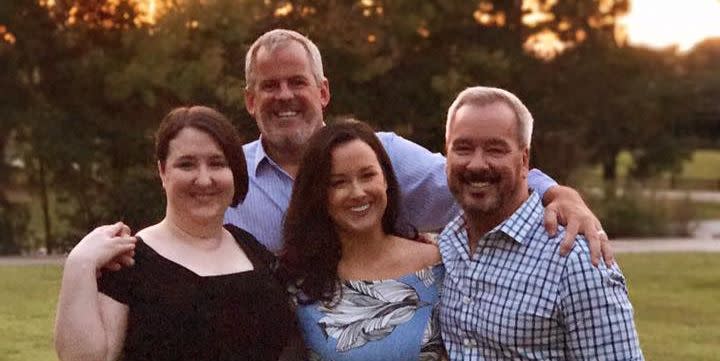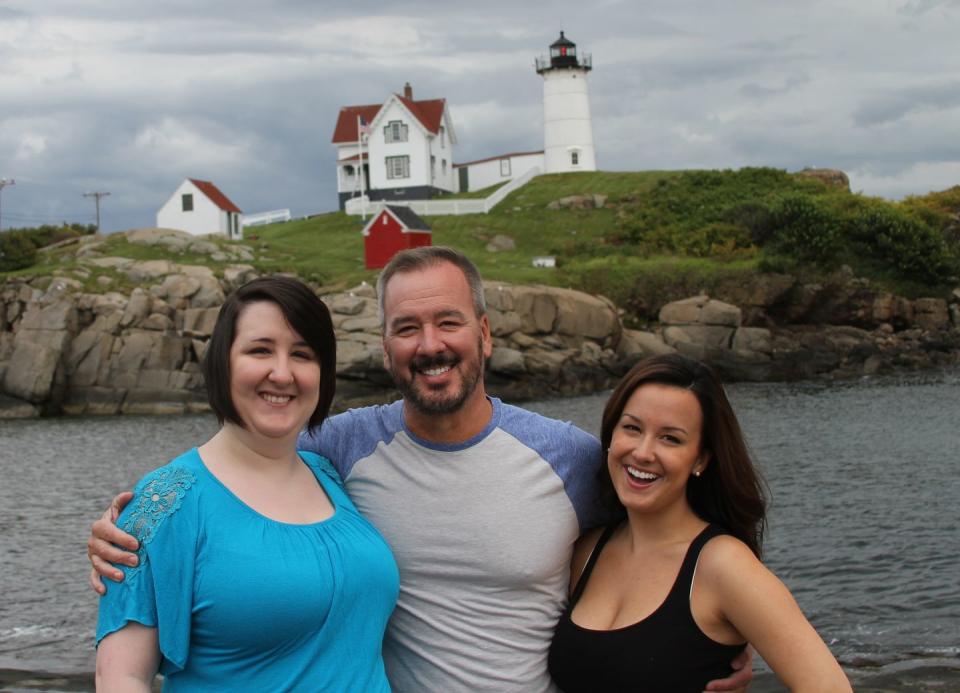How I Finally Came Out to My Wife and Daughters After More Than 20 Years

In OprahMag.com's series Coming Out, LGBTQ change-makers reflect on their journey toward self-acceptance. While it's beautiful to bravely share your identity with the world, choosing to do so is entirely up to you—period.
In The LIE, A Memoir of Two Marriages, Catfishing & Coming Out, author William Dameron tells the story of his life. The first "lie" in question was a selfie of Dameron that had, unknowingly to him, become part of a nationwide catfishing scheme. But the issue of his stolen identity and the smoky mirrors around it caused the author to reflect upon his own life—and the many lies he had told to his wife and two daughters over more than two decades. After its release last year, Dameron's debut memoir was called "compelling," and "darkly animated" by The New York Times, and a book that "celebrates truth and honors the redemptive power of forgiveness and love," by Kirkus Reviews.
Here, in a moving personal essay for OprahMag.com, Dameron reflects on his journey toward learning to love himself—while allowing his family to do the same. And in doing so, he reminds us all that for many in the LGBTQ community, the acting of coming out does not mean stepping out of just one "closet," but many.
For as long as I can remember, I knew I was different. "Bill is such a special child," my mother would drawl, a Southern euphemism meant to protect me from that knowledge. Growing up in North Carolina, the South was my first language teacher. It was a land where “Bless your heart,” could mean everything, and special was uttered as a spell of protection and prayer that special boys would not grow up to become the wrong kind of men. Language was elusive. Gender roles were firm.
Growing up special meant growing up apart. On one summer evening when I was seven or eight years old, I remember playing with a couple of special boys in the neighborhood, while my brothers played football in the backyard with the others. We special boys took the football and rolled it down the driveway, watching it bob back and forth while we created a little dance, which we called the wobble dance.

“Y’all are acting like a bunch of girls,” one of the mothers yelled at us.
The look of disapproval on her face wiped away any doubt that we were special in a good way. Those two boys were like me. It was a secret we shared at an early age. Though we did not have the vernacular to state our sexuality, we could express it through our actions. To this day, I feel a tinge of embarrassment about sharing this scene.
"Don’t put your hands on your hips. It looks effeminate."
The language of shame is a deft shapeshifter. As I grew older, the word special shifted from a form of protection to the shape of correction. Effeminate, my mother began to say. There were hundreds, if not thousands of reminders of how I should act more like a boy, and less like a girl. (See: homosexual.) I can write about this now without worrying that I’m calling my mother out, or placing blame. She has evolved to become my strongest ally. But in those early years, in her desire to protect me, she became the builder of my very first closet, the door barred with the word effeminate.

Always a skinny kid, I felt as if my body threatened to betray my deepest secret. “Skeleton legs,” is what one classmate called me when I wore shorts to school one hot day. My mother—bless her heart—told me I should press weights. Instead, I stopped wearing shorts, choosing to cover my shame, rather than accepting my body and who I was inside it. That’s the thing about closets. What is hidden always finds its way out—if not as the truth, then as another lie. Like an endlessly nested matryoshka doll, my mother and I began constructing closet after closet. I would retreat into myself until 1983.
I was 19 years old when I spent the summer with my Aunt Sheila in Denver, Colorado. “Your aunt is”—my mother lowered her voice—“a lesbian.” Even uttering that word seemed criminal. My mother asked me to promise that I would not let Sheila change me. I agreed. I knew what I was, I just could not say it.
But on that visit, I witnessed the toll the lack of acceptance took on Sheila. Most nights, I’d find her swimming in a bottle of vodka, one word slurring into another, revealing the shame that had been passed down like a family heirloom for generations. It went from my great uncle Don who died at 50 from cirhosis—the confirmed bachelor, another euphemism for being gay—to my Aunt Sheila, and then to me. At summer’s end, when I returned to North Carolina, I attempted to come out to my mother.
“Great uncle Don, Aunt Sheila, and me...we’re all the same. And the love we feel is the same, too,” I said.
"Homosexuality is sinful and disgusting," my mother replied.
When faced with the raw truth, my mother cast innuendo and euphemisms aside. As a parent now, I understand how, back then, a mother who raised a gay child was judged just as harshly. Coming out would mean carrying an entire family’s weight of shame on my back, a burden a skinny kid like me could not possibly bear. Many believe that conversion therapy only occurs in an institution, but more often than not, it takes place at the dining room table.
My world would never alter, so I did. The words of my youth—special, effeminate, disgusting, diseased, and sinful—were enough to scare me into believing that a family’s love could be conditional. And the AIDS epidemic, which would later claim the life of one of my wobble dance partners, was the exclamation point.

And so I met, fell in love with, and married a young woman who had survived her childhood. Yes, it is possible for a closeted gay man to love a woman—if not completely, then enough to believe that he does. I had come to believe that normal was the only word for happiness. We cried tears of joy at the birth of our two daughters. The knocking on all of those closet doors—and the words yearning to break free—were quieted. I lived in that space between light and shadow for the next 20 years.
And then the knocking began again, growing louder, and more desperate. I tried to quiet the noise by self-medicating with prescription drugs and alcohol; another secret, another closet. When I began to crumble on the inside, I attempted to shore up what was on the outside. While my family was sleeping, I would slip into the downstairs bathroom, fill a hypodermic syringe with steroids, and plunge it into my skin. My twisted logic was that I could hide who I was on the inside with muscle on the outside; a walking euphemism. People talk about toxic masculinity...well, mine was nearly fatal.
When you have so many closets, you must be hyper-organized to keep everything in place, so that your secrets don’t slip. It takes an incredible amount of energy, which after some time, I could no longer muster. The first secret to surface was the discovery of the empty bottle of prescription pain killers, which I shooed away as work stress. The second was a vial of steroids, discovered by my wife and two daughters. The next were the syringes hidden inside my work bag. Like un-nesting the matryoshka dolls, the secrets were revealed, but I kept the heart of the lie hidden, until months later on a Wednesday night, in a Walmart parking lot.
“I just have to ask you this now, or I’m afraid I never will,” my wife hesitated. “Are you gay?”
How could I admit to what I could not even name?
“I don’t want to be,” I replied.
“Oh, God,” she said.
I think our world needed to explode, to break down all of those closet doors, to destroy all of those labels. People tell me I’m brave to have come out after so many years, but it was the woman who stood to lose the most who took a sledgehammer to my closets and saved me. That’s bravery. All of those years, I attempted to be more of a man. If only I’d had a woman’s strength. I was too scared to state what I was, choosing instead to say what I did not want to be. Beneath all of that wreckage, there was still love. For that, I am eternally grateful.
My ex-wife, daughters and I have created a new definition for the word family—but first, we had to navigate through the maze of forgiveness. It was like learning a new language, complicated and full of misunderstandings, frustrations, and anger, the hard work of surviving and demolishing one’s shames, until it finally clicked.

I met and married a man who thinks I’m special—in the best possible way. Our five children consider each other family. And now, my ex-wife is engaged to a man who loves her completely.
I still struggle with the stigma and shame of having lied about my identity for so many years. I am a white male, and these two things grant me an undue privilege, which makes me feel like I am attached to the queer community by the slimmest of tethers. Still, while coming out anywhere in this world can be dangerous, the intersection of my race and gender made it easier for me. Not everyone can afford to live openly.
I used to think that being gay meant I had to accept all of those other words used to describe me. But just as there are many letters of the alphabet that make up the queer word (LGBTQIA+), there is no one way to be gay. My husband and I are monogamous, and quite boring. I am proud to claim my letter, no matter how late I decided to embrace it.
People often ask why I waited so long to come out. What they’re really asking is how I lied for all of those years. The answer has less to do with why I waited, and more with how it was even possible that I found my way out. Because believe me, a common myth is that when you are gay, there is only one closet door to open. I understand why folks wonder: How difficult can that be? But I had so many doors to open, and so many lies to unlearn, that it was easy to lose count and become lost.
Every so often, I’ll see a special boy who reminds me of one of my wobble dance partners. He’ll be off by himself, or playing with a group of girls, as his parents wear a pained expression. I can sense what they’re thinking, because I have heard it too often: I accept him...I just don’t want life to be hard for him.
To these parents, I want to scream, “Don’t say you accept him! Say that you celebrate him!” Bless their hearts; words matter. I know this because, after more than four decades on this earth, I finally learned how to use mine.
For more stories like this, sign up for our newsletter.

